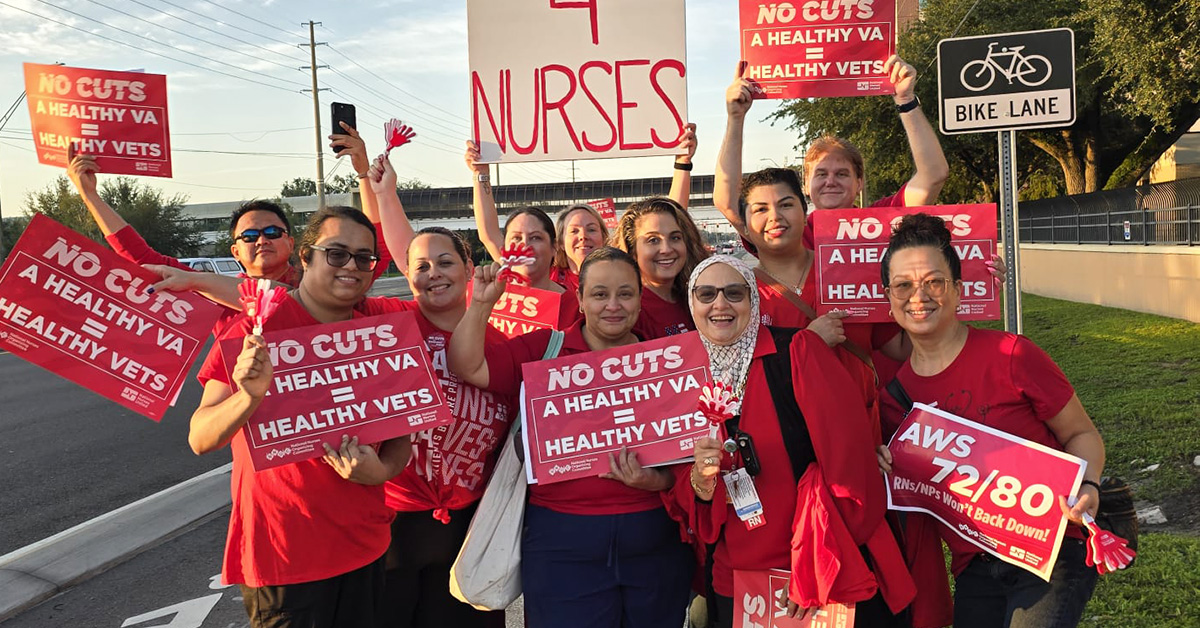VA nurses across country fight for safe staffing, protest hiring freeze

Staff report
National Nurse magazine - July | August | September 2024 Issue
Registered nurses who work at Veterans Affairs (VA) hospitals around the country, from New York to Ohio to North Carolina to Florida, held a national week of action in August. The nurses, who are represented by National Nurses Organizing Committee (NNOC), are calling on the VA to lift what is in effect a hiring freeze that has contributed to more than tens of thousands of vacancies across the health system, including thousands of RN positions. RNs say the freeze is putting patient safety at risk and undermines the VA’s commitment to providing veterans with high-quality, integrated, veteran-specific care that only the VA has the experience and expertise to provide.
“Last August, the Tampa VA opened up a beautiful new tower with 136 beds, but we have not seen that investment in staffing, even as we’re in a crisis,” said Justin Wooden, RN in the intensive care unit (ICU) at James A. Haley Veterans' Hospital in Tampa, Fla. “Right now, our ICU nurses are being pulled to units across the hospital, responding to medical emergencies. Meanwhile, we’re missing critical staff like transport teams and nursing assistants in the ICU. Too often, nurses are being asked to work in units with specialized patient populations whom they don’t have experience with. These stopgap measures are not safe for our patients and undermine their care.”
According to the VA’s own inspector general, 82 percent of VAs are experiencing critical nurse shortages. Some of the hardest-hit patient care areas include ICUs, units where the sickest patients receive lifesaving care. Due to the hiring freeze that has been in effect since Jan. 30 of this year, there are not enough RNs to cover patients coding, rapid responses, or routine transportation and testing needs. Due to the short staffing in the critical care units, RNs without critical care specializations are being floated there. As a result of short staffing, beds in these units are closing, limiting patient care for veterans.
“In our medical-surgical and intensive care units we’re seeing critical shortages because management made a unilateral decision to move our specialized float pool RNs elsewhere,” said Shana Rivera, RN in the ICU at Cincinnati VA Medical Center in Ohio. “Losing those specialized floating nurses challenges our ability to safely fill staffing gaps and provide the quality patient care that our veterans deserve.”
“We know we at the VA are best qualified to care for our nation’s veterans,” said Irma Westmoreland, RN at Charlie Norwood VA Medical Center in Augusta, Ga., and NNU vice president and Veterans Affairs chair. “That’s why we need the resources to provide care that honors their services and their sacrifices. When we don’t have enough staff, we are effectively cutting services to our veterans. That is why we are calling on the VA to lift this hiring freeze, so we can get back to providing holistic, specialized, veteran-centric care to our nation’s heroes.”
NNOC/NNU represents more than 15,000 registered nurses at 23 VHA facilities across the country, many of whom are veterans themselves.